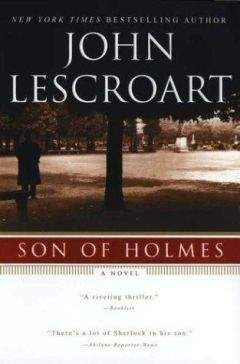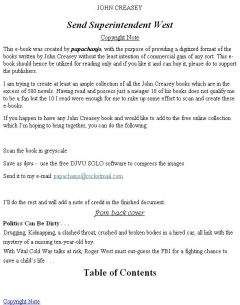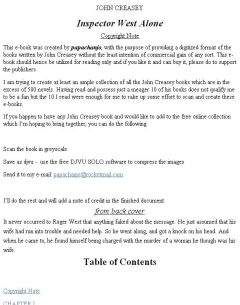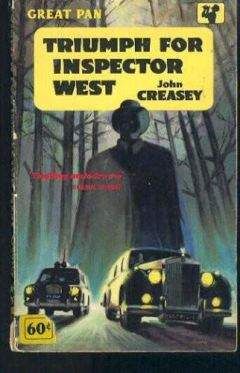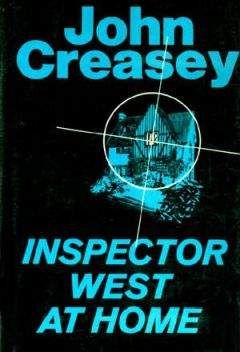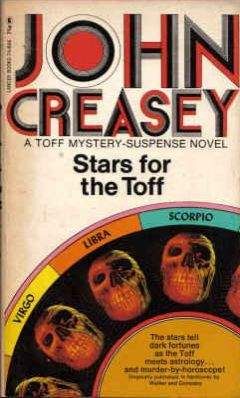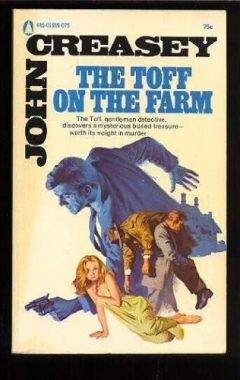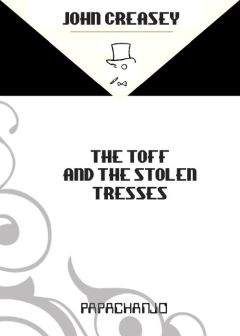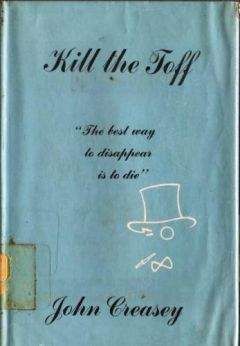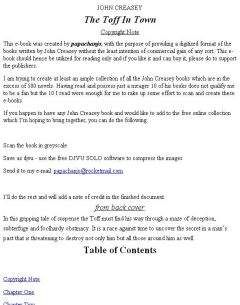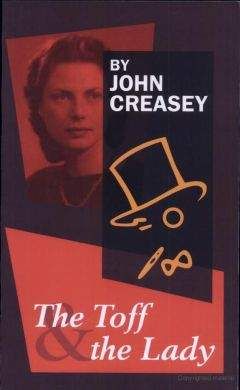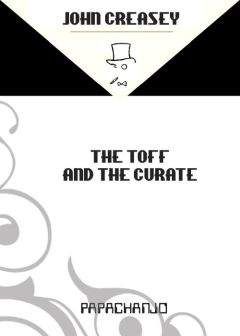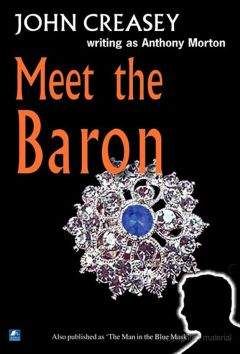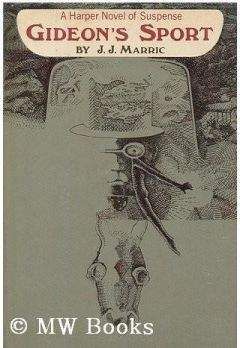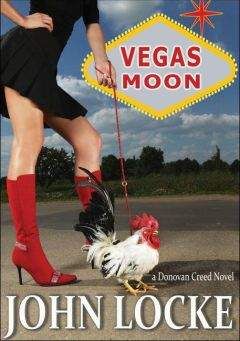John Creasey - Alibi
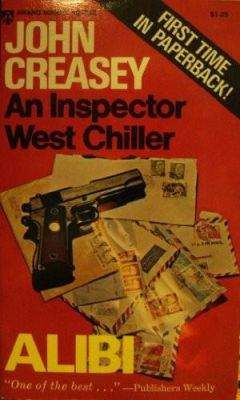
Скачивание начинается... Если скачивание не началось автоматически, пожалуйста нажмите на эту ссылку.
Жалоба
Напишите нам, и мы в срочном порядке примем меры.
Описание книги "Alibi"
Описание и краткое содержание "Alibi" читать бесплатно онлайн.
“I’ll have my bath now and get dressed—you open the door when she comes. I’ll bring coffee at a quarter past ten, is that right?”
“Ten o’clock,” urged Roger. “I’m not sure how this interview will go, and I could make heavy weather of it.”
“Why?” asked Janet. “Isn’t she buxom enough for you?”
Five minutes later he was outside, snipping the fading heads off some scarlet parrot tulips and noticing the trimness of lawn and hedge which he had hardly seen during the pressures of the past few weeks. Did either of the boys help Janet much? he wondered. Or was this mostly her work? Practically nothing needed doing, he must remember to compliment her.
He was pulling a few weeds, mostly seedlings, when a car drew up. He looked through the thick privet hedge, able to see that it was a white M.G.: just the car he could imagine Rachel Warrender having. And it was her. She climbed out, and he was slightly startled by her appearance, for she wore a white linen trouser-suit, accentuating her youth and slimness of figure, and a small, round, sailor hat. Not at all the average person’s con-ception of a woman solicitor, Roger thought amusedly. He felt sure that Janet, watching out of the window, would have eyes rounded in surprise.
“Good morning, Miss Warrender,” he called across the hedge. “You found the house all right, then.”
She started, and turned to look at him. And now he was even more startled: in fact appalled. For she looked in terrible distress. Her beautiful eyes were shadowed, and so glassy that he doubted if she had slept all night. She nodded, and formed the words “good morning”, but did not utter a sound. He met her at the gate, and saw that there were tears in her eyes as well as lines at her forehead and mouth. He didn’t shake hands but led the way to the front door, said, “The door on the right,” and followed her into the sittingroom.
Roger doubted whether she would have noticed if this had been a pigsty, she was so preoccupied with her own problems. She sat down in a chair, looking so ill and troubled that he even found himself wondering whether she took drugs and was in urgent need of a shot.
Then, she looked at him very straightly, and said, “Mr. West, I think you are the only man who can help me, and I’m not even sure that you will. May I tell you what is troubling me? And may I beg you to give me your advice?”
Chapter Fifteen
RACHEL
“If I can help, I certainly will,” Roger answered, gently. “And if it’s something which, as a policeman, I can’t discuss, I’ll tell you. Are you comfortable there?”
“Perfectly, thank you.”
“Will you have a cup of coffee, or—?”
“Nothing, thank you.” She sat upright, and placed her hands on the arms of her chair. “In the beginning it was very simple, but I now believe that you were right and I was wrong. I am afraid that Mario Rapelli did attack Verdi. When I appeared in court I felt sure that he was a victim of conspiracy, and that the police wanted a conviction whether he was guilty or not guilty. I don’t think that is true now.”
“I’m very glad,” Roger said; he wanted to hear all she had to say before asking questions.
“Even last night, when we talked, I hoped I was right first time. But I now have proof that Maisie lied in the witness box and that the other witnesses also lied to me. And I’ve made another discovery, Mr. West, in its way just as bad.” She leaned forward, her eyes seeming to grow bigger and bigger. “I’ve had a private investigator checking. I know that the two men who saw the attack on Verdi, your two witnesses I believe, were approached and offered a substantial sum of money to renege. Smith- son refused, but Campbell agreed.” Now, her face seemed nothing but eyes. “Smithson is dead, and Campbell switched right round and tried to compromise you.”
When she stopped, Roger said evenly, “Do you know who killed Smithson?”
“Fogarty, of course.” Rachel paused, as if to find the right word, then went on, “I believe Fogarty was paid to run Smithson down. I know he claims to have been drunk but—did you know that he was practically a non- drinker?”
“The medical reports say that he had little or no alcohol in his blood that night,” said Roger.
“I should have known you would have discovered that,” remarked Rachel. “My father—” She caught her breath. “My father begged me not to take this case. Why was he so anxious I shouldn’t take it? Why — ?” She caught her breath again, and added, “If the worst thing that happened as a result of this were a blow to my pride, it wouldn’t matter a fig. But—”
Roger believed that she was coming to the crux of the visit. But there was a reservation in his mind, one he had to consider although emotionally he found the suspicion difficult to justify.
She could be fooling him.
These huge; brown eyes which looked so weary could be affected by eye drops or by drugs. Her story could be partly false; she could be presenting the case in such a way as to disarm him, to convince him (and so the police) that if she had committed any crime it was unwittingly: that she was the victim of criminals who had used her as a front. Roger knew that any solicitor who knowingly represented an accused man who was bribing witnesses, would be struck off without mercy, and she must know this too. She could be fighting for her whole future in her profession.
He wanted to believe what she said, but so much would depend on what she was going to say now.
Through tightly set lips, she went on, “I don’t think you know this, Mr. West, but Mario and I used—used to see a great deal of each other.” The words came as if she had to force each one out with a conscious effort. “I—I loved him, Mr. West—but when I discovered he was meeting Maisie Dunster and going to all these odd parties, I stopped seeing him. Then, the other day, he telephoned me and said he was in trouble. It was such a shock, both what he told me and hearing from him again—I was just beginning to forget him—” Rachel bit her lip “—I told him I couldn’t possibly take the case. Then, almost at the last minute, I changed my mind. That was why he looked so startled when I appeared in court. I believed what he’d told me, Mr. West—after all, it was because of Maisie and those—those parties, that I gave him up.” She laughed bitterly. “But it now appears that he paid —bribed—all these people to lie for him. And bribed them before he attacked Verdi. If he’d struck Verdi in a fit of rage, I wouldn’t have been so troubled. If he’d told me exactly what had happened, I’d have done everything humanly possible, I would have paid for the best possible counsel. But he deliberately lied to me. Deceived me. Found the money to pay these false witnesses. Yet he earns scarcely enough to keep himself; he has often borrowed from me.”
She paused, as if for breath, and now Roger no longer doubted her sincerity.
“Where is he getting the money?” Rachel asked chokingly. “Who is financing him, and why? Did he attack Verdi for personal reasons, or was there some other reason? Why was my father so desperately anxious I shouldn’t take this case? Can you find out, Mr. West? Before next Thursday when Mario comes up for the second hearing? I need to know before—before I decide whether to defend him or not. Can you, please?”
And now Roger thought he knew what she was asking.
She realised he would find out all he could about Rapelli and the murder, that he would go ail out to get at the truth; and she wanted him to tell her, the defending solicitor, in advance. But he simply could not tell her except through the normal channels—and that would have to be at the trial. To help her before the police court hearing he would have to betray not only the general police code but his own standards.
Yet how could he say no?
• • •
Roger heard Janet come down the stairs, and guessed she would soon be in with the coffee. He wasn’t at all sure that her presence would help this situation, but knew, after what had happened, that he could not keep her away. But he could prepare Rachel for her arrival and at the same time give himself the chance to think.
“Rachel,” he said, suddenly, “my wife will bring some coffee in a few minutes. I would like to ponder this until she’s gone.”
Rachel made no protest of any kind, and showed little reaction.
“You will consider it?” She sounded pleading.
“I will.”
“You—you’re very good,” she said huskily.
Five minutes later Janet came in, looking fresh and elegant in a dark brown dress, her hair attractive, her make-up perfect. She was at her beautiful best, and carried off a situation like this as few others could. She was obviously curious but didn’t ask questions; was pleasant and friendly but overdid nothing.
Suddenly, she stood up.
“Roger dear, do pour Miss Warrender some more coffee, when she’s ready. I have to go out. Miss Warrender, I don’t know whether to hope you win, or Roger, but I do hope you both come out of this case with credit.”
“Especially your husband,” Rachel said drily.
“If it has to be one or the other—yes!” Janet laughed, shook hands, and left. Rachel watched her go out of the room and then looked at Roger wonderingly.
“What a lovely woman!”
“We certainly agree about that,” Roger said, laughing. “And I agree”—he sobered immediately—” that we have a difficult problem. I would like to help, but helping at this stage, if it were known, could create an intolerable situation for me. You have no idea what happens when a police officer stretches the law.”
“I can imagine,” Rachel said. She looked better, brighter, but there was tension in her voice again. “Are you telling me nicely that you won’t help?”
“No,” Roger said. “I am simply saying that I need to study all the angles before I make you any promise. When must you know?”
“I don’t need to know until Wednesday morning, I suppose,” she replied. “An hour would give me time to find someone else to represent Mario. Will you let me have word one way or the other by Wednesday at nine o’clock?”
“Yes,” promised Roger.
She rose to her feet, her expression even brighter, and clasped his hand with both of hers.
“You’re very kind and understanding,” she said. “Thank you very much. And now I must go. I’ve taken up far too much of your time already.”
He showed her to the door and she stepped along the path too quickly for him to reach and open the gate for her. He did not want to attract much attention from his neighbours, so he turned back into the house. It was too early to reach any kind of conclusion, but he had become very predisposed towards helping the girl.
But supposing he did, and it were found out? What would Trevillion do or say? What would be his chances of staying in the Force, and what would be the result if he didn’t? If he were dismissed ignominiously, would he still be eligible for the Allsafe job?
Supposing he checked that with Artemeus before he made a decision?
He thrust the thought aside. He hadn’t even decided whether to tell Janet about the offer, hadn’t decided whether he wanted the job, good though it was. He had to decide on the strength of his feeling for or against the Yard, not on one issue which was a long way from being typical. There were short term things he had to do; among them, see Rapelli.
But first, the Yard.
He heard Janet hurrying down the stairs, went to the foot of them and called, “Can I give you a lift?”
“Oh, darling, if you would.” Janet’s eyes lit up. “I’m going to a committee meeting at the Town Hall, if you could just drop me off there.”
Ten minutes later he leaned across and opened the door for her, vividly reminded of doing exactly that for Maisie Dunster only a few hours ago, only a few hundred yards away from here. He did not dwell on that, but drove quickly to the Yard through thick traffic. The day was warm, the exhaust fumes were strong, it was the kind of day when anyone who had to work indoors was likely to be bad-tempered.
There was a kind of lethargy about the Yard, and a noticeable slackness among both senior and junior officials who were in the passages. With Coppell on the spot no one slouched, few groups gathered in the passages, but with Coppell away . . .
Roger wondered whether he himself would behave any differently in such circumstances, and decided that Coppell or no Coppell, he would behave in exactly the same way. Wasn’t that what most of this trouble was about?
Danizon, jacket off, was in his, Roger’s, office.
“Good morning, sir,” he welcomed. “Still all clear. Very little of any kind has come in during the night.” He pushed a thin file closer to Roger as he sat down. “Like some coffee, sir?”
“No, thanks,” Roger said, and opened the report folder.
Maisie Dunster hadn’t stirred from her flat according to two divisional men detailed to watch her. They had been relieved at eight o’clock and their place taken by others.
Pearson had gone home and had a tremendous quarrel with his wife; but neither of them had left the house since.
The post mortem on Ricardo Verdi showed that death had come from cerebral haemorrhage following a blow with a blunt instrument, compatible with an electric guitar.
The post mortem on Wilfred Smithson showed that death had followed multiple injuries to the head, chest and stomach, likely to be caused by being struck by a moving car.
There was as yet nothing to suggest that Verdi and Rapelli were old friends or associates, or even that they had known each other. There was plenty of evidence that Maisie Dunster had known both, however; some that Verdi as well as Rapelli had received her favours. As far as the police could find out, only two persons had known practically all the people involved. One was Patrick Fogarty and the other was Maisie. Yet there were no new revelations about either. The main inexplicable factor, however, was that Hamish Campbell had switched sides with such alacrity. Had Rachel Warrender been right? Had he been bribed? If so, how had Rachel—or her enquiry agent—discovered what the police, so far, had failed to discover? There was another question which, deliberately, he had not asked for. Did she know that Rapelli had planned to attack Verdi, even arranging his “alibi” in advance?
Roger pondered these questions, soaked up all that was new in the reports, then put his head round the door of Danizon’s office, and said, “I’m going over to Brixton to see Rapelli.” He closed the door on Danizon’s “Right, sir.” Danizon would warn the authorities at the prison that he was on the way and Rapelli would probably be out of his cell and in one of the interviewing rooms at the front of the building.
He was at Brixton at a little before one o’clock.
Keys clanked, steel-capped boots clattered on cobbles, even in the sunlight the walls looked grim and grey. The big open courtyard was comparatively cool and the first big hall into which Roger was taken was almost chilly.
Подписывайтесь на наши страницы в социальных сетях.
Будьте в курсе последних книжных новинок, комментируйте, обсуждайте. Мы ждём Вас!
Похожие книги на "Alibi"
Книги похожие на "Alibi" читать онлайн или скачать бесплатно полные версии.
Мы рекомендуем Вам зарегистрироваться либо войти на сайт под своим именем.
Отзывы о "John Creasey - Alibi"
Отзывы читателей о книге "Alibi", комментарии и мнения людей о произведении.






